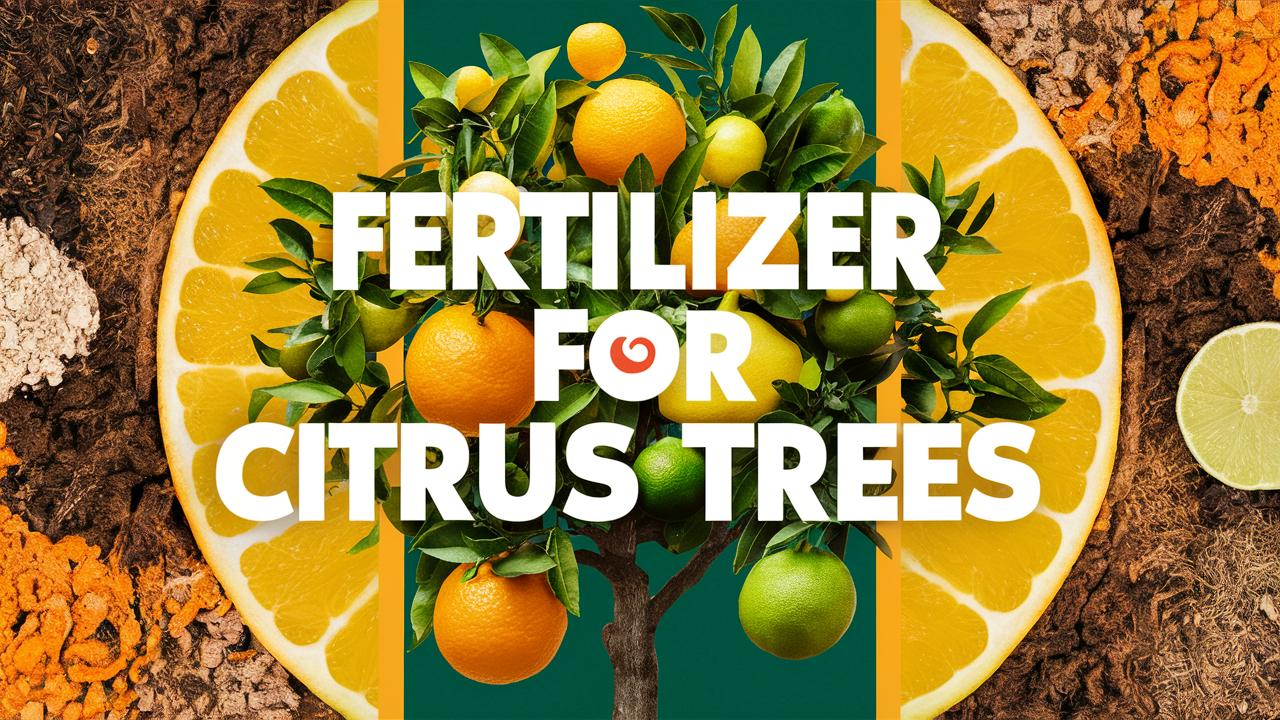In guide, we’ll explore everything you need to know about selecting the best fertilizer for your citrus trees, ensuring they grow strong and productive.
Fertilizer For Citrus Trees
| Image | Name | Rating | Shop |
|---|---|---|---|
 | SimplyGro Fertilizer Spikes |  | |
 | Citrus Tree Fertilizer Plus |  | |
 | GardenWise |  |
SimplyGro Fertilizer Spikes
Fertilizer Spikes for Citrus & Fruit Trees & Shrubs (24 Spikes – 6.0 Lbs) is a great product for those who want to provide their trees with consistent nutrient intake. The 8-8-8 formula of this fertilizer is specially designed for citrus, fruit, nut, and berry trees and shrubs.
This product offers several benefits, including easy application (simply hammer the TruSpikes into the ground) and hassle-free fertilization (no need to worry about over-fertilizing or nutrient loss). Since fertilizer spikes nourish below ground where plants need it most, you can expect lush leaves, vibrant colors, beautiful flowers, and bountiful growth. Plus, with two applications per year, you’ll be providing your trees with the nutrients they need to thrive throughout the growing season.
Citrus Tree Fertilizer Plus
If you’re looking for a reliable and effective fertilizer for your citrus tree, consider using Farmer’s Secret Citrus Tree Booster Fertilizer. This super concentrated formula is specifically designed to promote healthy growth, strength, and abundant production in all types of citrus trees, including lemons, limes, and oranges.
This product is easy to use – simply dilute one teaspoon of the fertilizer into one gallon of water and apply it weekly along the drip line. For younger or mature trees, you can adjust the dosage accordingly. Plus, it’s safe for both outdoor and indoor/container trees, with a reduced dosage recommended for pot-grown plants. With Farmer’s Secret Citrus Tree Booster Fertilizer, you’ll be giving your tree the scientifically-backed formula that farmers use – now in your own garden!
GardenWise
The GardenWise Professional Citrus Fertilizer + Vital Micronutrients is a well-rounded product that caters to the unique needs of citrus trees. Its balanced NPK formula promotes healthy growth, flowering, and fruit quality.
This all-in-one fertilizer contains essential micronutrients like magnesium, zinc, copper, iron, and boron that work synergistically to nourish your citrus trees at a cellular level. The slow-release granules ensure year-round nourishment, making it an ideal choice for gardeners of all experience levels. With its easy application and long-lasting effects, this fertilizer is a great investment for those looking to boost their citrus yield.
Down To Earth Citrus Mix Fertilizer
When it comes to giving your citrus tree the nutrients it needs to thrive, consider Down to Earth Organic Citrus Fertilizer Mix 6-3-3. This OMRI-listed product is specifically designed for organic production and provides a balanced blend of nitrogen, phosphorus, potassium, and other essential micronutrients like calcium, sulfur, zinc, and iron.
This citrus-specific fertilizer promotes healthy growth, lush foliage, fragrant blossoms, and abundant fruit production in your tree. And with its wide range of ingredients including feather meal, fish bone meal, alfalfa meal, greensand, langbeinite, basalt, sulfate of potash, zinc sulfate, and kelp meal, you can trust that your citrus tree is getting all the nutrients it needs to flourish. Plus, this fertilizer works just as well on other fruit trees, vines, and ornamentals, making it a versatile option for any gardener.
Citrus-tone Fertilizer
This fertilizer, Espoma Organic Citrus-Tone, is a suitable option for promoting vigorous growth and abundant fruit in citrus trees, including lemons, limes, oranges, Meyer lemon trees, as well as avocado and nut trees. The product has a 5-2-6 fertilizer analysis with 5% calcium.
The fertilizer’s composition of natural and organic ingredients is enhanced by the company’s exclusive Bio-tone formula, making it an environmentally friendly option. It is safe to use in organic gardening, being approved for this type of cultivation. The product is easy to apply – simply spread it around the drip line of the tree and water thoroughly. For best results, use Citrus-tone late winter pre-bloom, spring post bloom, and fall.
Lemon Tree Fertilizer
The TPS NUTRIENTS Lemon Tree Fertilizer is a simple and effective way to nourish your citrus trees. This liquid fertilizer comes in an 8 oz bottle and is easy to use – just mix 2 tablespoons with one gallon of water and water your plant as you normally would.
This nutrient-rich formula provides essential nutrients that promote healthy growth and vibrant fruit production, making it perfect for Meyer lemon trees and other citrus plants. It effectively addresses common concerns such as slow growth, yellowing leaves, or nutrient deficiencies, promoting vigorous growth and healthy, green leaves. This fertilizer is ideal for both indoor and outdoor use, making it a great option for gardeners of all levels to cultivate fruitful citrus trees.
Citrus Plant Food
This citrus tree fertilizer from TPS Nutrients is a great choice for anyone looking to promote healthy growth and fruit production in their citrus plants. With its simple mixing solution of 2 tbsp per 1 gallon of water, it’s easy to incorporate into your regular watering routine whether you’re growing indoors or outdoors.
The benefits of using this fertilizer are numerous – expect vibrant leaves, stronger roots, and increased fruit yield from a single application. What’s more, the formula is designed for ease of use and compatibility with various citrus plants, making it perfect for both new and experienced growers. Whether you’re looking to boost growth or enhance fruit production, this citrus tree fertilizer delivers balanced nutrition to help your plants thrive in any environment.
How to Choose a Fertilizer for Citrus Trees
Growing citrus trees in your garden can be a rewarding experience that yields delicious fruits while adding vibrancy and life to your outdoor space. However, for your citrus trees to thrive, they require proper care, and that includes choosing the right fertilizer. With so many options available, it can be overwhelming to navigate the landscape of fertilizers.
Understanding Citrus Trees’ Nutritional Needs
Before diving into the types of fertilizers available, it’s essential to understand the specific nutritional needs of citrus trees. These trees require a balance of nutrients: nitrogen (N), phosphorus (P), and potassium (K), often referred to as N-P-K, along with secondary nutrients such as magnesium (Mg), calcium (Ca), and sulfur (S).
Nitrogen
Nitrogen is vital for leaf growth and development. A healthy canopy of leaves is crucial for photosynthesis, which subsequently fuels fruit production. Citrus trees typically require a significant amount of nitrogen, especially in their growing season. However, too much nitrogen can lead to excessive leaf growth at the expense of fruit production, so finding the right balance is key.
Phosphorus
Phosphorus is essential for root development and flower formation. Strong roots enable your citrus trees to absorb water and nutrients more efficiently, and phosphorus plays a pivotal role in forming flowers, which will eventually develop into fruit. Most garden soils have sufficient phosphorus, but it may be necessary to supplement if your soil test reveals deficiencies.
Potassium
Potassium is crucial for fruit quality and helps trees withstand stress, such as drought or disease. It’s responsible for sugar development, which directly relates to the sweetness of your citrus fruits. A potassium deficiency can lead to smaller, less flavorful fruits, so maintaining proper potassium levels in your citrus fertilizer mix is pivotal.
Secondary Nutrients
In addition to the primary macronutrients, citrus trees require secondary nutrients like magnesium and calcium. Magnesium is vital for chlorophyll production, while calcium promotes cell wall structure and strengthens plants against environmental stresses.
Taking the time to understand these nutritional needs will help lay a solid foundation when selecting the right fertilizer for your citrus trees.
Assessing Soil Quality and Nutritional Content
Before selecting any fertilizer, it’s crucial to assess the quality of your soil. Conducting a soil test is an excellent first step, as it provides detailed insights into your soil’s pH and nutrient levels.
Why Soil Testing Matters
Soil tests can reveal deficiencies and excesses of various nutrients, enabling you to tailor your fertilization regime to meet the specific needs of your citrus trees. A test typically measures pH, nitrogen, phosphorus, potassium, and other micronutrients.
For ideal growth, citrus trees generally thrive in slightly acidic to neutral soil, with a pH range of around 6.0 to 7.5. If your soil test shows an imbalance, you can choose amendments to correct the pH before introducing fertilizers.
Interpretation of Soil Test Results
After you receive the results of your soil test, pay close attention to the nutrient levels reported. If the test indicates a shortfall of nitrogen, potassium, or other vital nutrients, you can opt for fertilizers that specifically target those deficiencies. Conversely, if the soil is already rich in a certain nutrient, you can avoid high-concentration fertilizers for that element.
Types of Fertilizers for Citrus Trees
Understanding the different types of fertilizers can guide you in choosing the right one for your citrus trees. Here, we will explore three primary types: granular fertilizers, liquid fertilizers, and organic fertilizers.
Granular Fertilizers
Granular fertilizers come in solid form, offering a controlled release of nutrients over time. They are easy to use and typically require less frequent application compared to liquid fertilizers. For citrus trees, look for fertilizers specifically formulated for fruit trees or citrus trees, typically displaying an N-P-K balance suitable for their growth stage.
Granular fertilizers can be application-rate specific, so reading the label for precise recommendations is important. Make sure to apply them during the active growth period, typically in spring and early summer, to coincide with your trees’ increased nutrient needs.
Liquid Fertilizers
Liquid fertilizers are highly concentrated solutions that provide rapid nutrient absorption. They are particularly useful for fast-acting needs, especially when foliage shows signs of nutrient deficiency. You can apply liquid fertilizers through a foliar spray or soil application.
Liquid fertilizers can be beneficial if you notice any signs of deficiency, such as yellowing leaves or poor fruit development. However, because they require more frequent applications, you must keep on a consistent schedule for optimal results.
Organic Fertilizers
For those looking to maintain sustainable practices in gardening, organic fertilizers can be the ideal choice. These fertilizers are derived from natural sources such as compost, manure, or bone meal and typically have a lower concentration of nutrients than synthetic options.
Organic fertilizers improve soil health as well, introducing beneficial microorganisms that contribute to overall soil fertility. Keep in mind, however, that they may take longer to show results compared to synthetic fertilizers because of their slow-release properties.
Fertilizer Ratios and Formulations
When selecting a fertilizer for your citrus trees, the N-P-K ratio is one of the most important factors to consider. This ratio tells you the relative amounts of nitrogen, phosphorus, and potassium within the fertilizer.
Choosing the Right Ratio
For growing citrus trees, look for fertilizers with a balanced N-P-K ratio suitable for your tree’s growth stage. For instance, a fertilizer with a ratio of 6-6-6 is frequently recommended for young trees, while an N-P-K of 8-2-10 might be appropriate for established trees, focusing on promoting healthy fruit production with a boost to potassium levels.
Slow-Release vs. Fast-Release Formulations
You’ll also come across slow-release and fast-release formulations. Slow-release fertilizers break down slowly over time, providing a steady supply of nutrients. They are beneficial in preventing nutrient leaching caused by heavy rains or excessive watering, ensuring that nutrients are available to your trees as needed.
In contrast, fast-release fertilizers quickly supply nutrients to your trees, which can be ideal in cases of deficiency. Utilizing a combination of both slow and fast-release fertilizers may be an effective strategy for maintaining balanced nutrition throughout the year.
Timing Your Fertilization
Proper timing for fertilizer application can significantly impact your citrus trees’ health and productivity. Citrus trees typically follow a specific growth cycle, which should guide your fertilization schedule.
Early Spring Fertilization
As spring approaches and temperatures rise, citrus trees begin to actively grow, making it the perfect time to fertilize. Early spring is the ideal opportunity to provide your trees with the nutrients they need to produce healthy foliage and flowers.
Summer Boost
As your citrus trees continue to grow and develop fruit, a mid-summer boost of fertilizer can help provide the additional nutrients needed during this critical period. Pay close attention to your trees’ growth: if they appear stressed or show signs of nutritional deficiency, consider a summer application.
Fall Considerations
In the fall, as your trees prepare for dormancy, reducing or even ceasing fertilization is advisable. Over-fertilization in the fall can lead to new growth that may get damaged by cold temperatures. If your trees are still bearing fruit late into the season, you may opt for a light feeding to support fruit maturation.
Incorporating Companion Planting
Fertilizing your citrus trees is important, but you can also enhance their overall health by incorporating companion planting. This involves growing specific plants that support each other, improving soil health, and repelling pests.
Beneficial Companions for Citrus Trees
Consider planting herbs like basil, garlic, or rosemary around your citrus trees. These plants can enhance the soil’s nutrient profile and deter common citrus pests. For instance, garlic and rosemary may help repel aphids and other harmful insects. Moreover, a diverse planting can strengthen the ecosystem in your garden, fostering natural pest control.
Mulching for Nutrient Retention
In addition to companion plants, using organic mulch around your citrus trees can be beneficial. Mulch conserves moisture in the soil, suppresses weeds, and, as it breaks down, adds organic matter and nutrients back into the soil. This added layer of protection helps create a more robust environment for your citrus trees to flourish.
Monitoring and Adjusting Your Fertilization Practices
Once you have started fertilizing your citrus trees, ongoing monitoring and adjustment is important. Gardening is a dynamic process, and no one-size-fits-all solution will work every year.
Observing Plant Health
Keep a close eye on your trees to gauge their health and respond to any changes you notice. Yellowing leaves, poor fruit development, or stunted growth can indicate nutrient deficiencies, excesses, or even other environmental stresses. Your observations will help you fine-tune your fertilization schedule and nutrient selection.
Adjusting Based on Seasonal Changes
Weather conditions can influence nutrient uptake. Heavy rain, for example, can leach nutrients from the soil, while dry spells may require more frequent watering and support for nutrient retention. Stay alert to seasonal changes and adapt your fertilization practices accordingly.
Conclusion
Choosing the right fertilizer for your citrus trees requires an understanding of their unique nutritional needs, soil quality, and an awareness of the many fertilizer options available. By carefully selecting the right N-P-K ratios, timing your applications, and continuously monitoring your trees, you will nourish healthier, more productive citrus trees.









